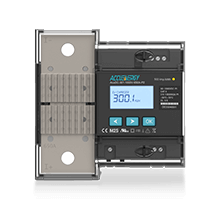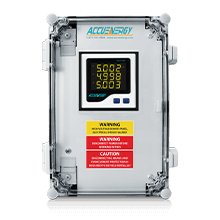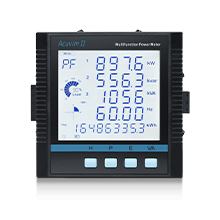Energy Metering for Electric Vehicle (EV) Charging Stations

The number of Electrical Vehicle (EV) charging stations are steadily increasing everyday as electric vehicles become more popular. More and more, EV's are being accepted as a valuable component of the auto industry growth. As a result, EV charging stations can be found in private residences, public dedicated charging stations and even at commercial and residential buildings such as offices and condos.
With residential use, these charging station's energy cost is added to the homeowner's utility bills. Although there are stand alone charging stations such as the Tesla Supercharger may offer free charging, many other charging stations offered by high-use commercial or residential buildings can consume significant amount of energy as EV owners "refuel" their electric cars power supply. In cases like these, energy consumption and cost by EV stations needs to be metered accurately.
Electric Vehicle Market is Growing Fast
Over the past year, global sales of new electric vehicles surpassed 17 million, reflecting growth of more than 25%, according to the International Energy Agency. If this trend continues, electric vehicle sales are expected to exceed 20 million by the end of 2025, accounting for roughly one-quarter of total global car sales.
As of the end of 2024, electric car sales in the United States increased to 1.6 million, raising its market share to over 10%. In Europe, the market share remained steady at 21%, with 3.3 million new electric car registrations.
EV charging infrastructure is also expanding rapidly to keep pace with growing demand. In 2024, more than 1.3 million public charging points were added worldwide, marking an increase of over 30% compared to the previous year. In Europe, the number of public charging points grew by more than 35% in 2024, reaching just over 1 million. Meanwhile, the United States expanded its public charging network by 20%, bringing the total to just under 200,000 charging points. These figures are expected to continue rising as electric vehicle driving ranges surpass 300 miles per charge.
As a result, more residential and commercial facilities are installing EV charging stations, creating a growing need to monitor and track energy consumption for accurate cost allocation and billing. In these circumstances, revenue-grade multifunction power and energy meters are essential to verify consumption and ensure accurate billing.
EV Metering Applications
Accuenergy offers a variety of solutions on both the AC and DC metering side with varying degrees of measurement dependant on your energy management needs.

EV Fast Charging Meter
Accuenergy offers the AcuDC 300 series EV fast charging meter, delivering revenue-grade metering and billing for charging stations. With an accuracy of 0.2% for ±650A and 0.1% for 60V to1000V, the AcuDC 300 exceeds the requirements of IEC 62053-41:2021 Class 0.5 and EN50470-4 Class C standards. It is MID and UL Recognized certified and supports the OCMF format, making it an ideal choice for compliant billing applications.
Additional features such as cable loss compensation, built-in data logging, and an anti-tampering electronic metrology seal help ensure precise measurement and secure data integrity, providing confidence and reliability.

Pre-Wired DC Control Panel
The AcuPanel 9104X-DC, equipped with the AcuDC 240 DC meter, is a pre-wired control panel designed to monitor and control EV charging systems by measuring key parameters. Its NEMA 4X polycarbonate enclosure protects against dust, water, and harsh site conditions, making it well-suited for both indoor and outdoor applications.
The pre-wired construction simplifies installation and reduces wiring errors, enabling faster deployment of EV infrastructure. With accurate, revenue-grade energy measurements, the panel supports accurate billing and UL 508A compliance.

Acuvim II Power Meter
Accuenergy offers advanced energy monitoring solution for those who prefer to have deeper look into the energy consumption and usage patterns of EV stations. Advanced AC monitoring allows remote monitoring via Ethernet-based connection and supports historical data logging of energy usage.
Data logs are stored in the meter built-in memory and can be exported to generate reports. The reports can help building managers improve energy management by providing better understanding of energy consumption patterns and determines when the maximum demand had occurred.
The application requires the use of Acuvim IIR or Acuvim IIW power meters for the inclusion of time-of-use (TOU) or time-based tariff billing.
Application Summary
Regardless of which solution best meets the applications goals, Accuenergy is able to support the development and deployment of EV charging stations by creating valuable measurement instruments to monitor the usage and effectiveness of charging stations as it becomes more prevalent.
